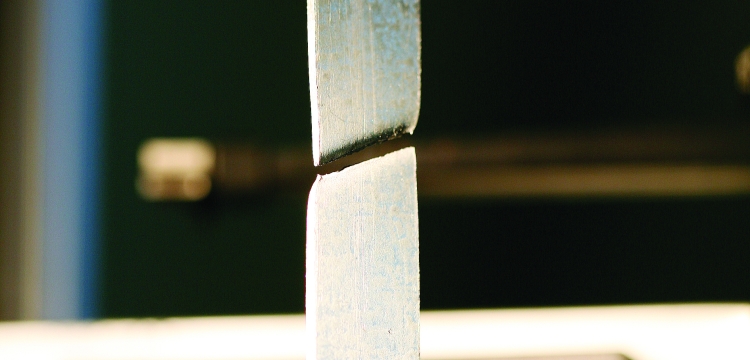Measure the mechanical properties of a metallic material


Mechanical properties of metallic materials
Your expectations
- You are looking for the right materials for a given application
- You want to characterise the compatibility of your materials with their environment
- You want to carry out tests to determine the specific mechanical properties of your material
- You want to determine the grade of steel corresponding to your material
- You are looking for reliable analysis and characterisation methods
- You want to ensure the traceability of your mechanical tests
Our solutions
A specialised team and resources in the field of test and characterisation of metallic materials :
- Static tensile tests to determine the mechanical properties (maximum strength, yield strength, module of elasticity, elongation, etc.), at room temperature, at high temperatures up to maximum 800°C, at low temperatures ranging to -196°C, in H2 environment.
- Impact bending tests (measurement of notch impact strength) on previously notched metallic test specimen, between ambient temperature and -196°C,
- Hardness measurements (Vickers, Brinell and Rockwell B and C)
- Flattening, bending, flaring tests,
- Tests and characterisation of many metals and alloys, either on standardised tests specimens or on products (tubes, bolts, etc.)
- Characterisation of material ageing and prediction of service life
- Characterisation of the environmental compatibility of materials
ZOOM ON HYDROGEN
HyMEET, our technological platform dedicated to H2, provides mechanical engineering with resources and skills needed to master low-carbon hydrogen production, distribution, storage and utilization technologies. HyMEET combines an ambitious R&D program with a €25 million investment in resources dedicated to characterization and validation tests (up to 1000 bar and in a range of temperatures from deep cryogenics to high temperatures) as well as consulting and training.
Its activities are dedicated to:
- Characterizing the behavior of materials in contact with hydrogen
- Development of specific test methods
- Characterization of specific mechanical equipment and systems in severe hydrogen environments.
Our equipment enables:
- Mechanical characterization of materials using fatigue machines in a high-pressure hydrogen environment
- Control of sealing systems and plant containment, with test benches developed to study gas diffusion phenomena, resistance to rapid decompression and sealing performance under severe conditions
- The study of the ageing of test specimens in high-pressure autoclaves
- Tests under cryogenic conditions for the use of hydrogen in liquid form, with several cryostats fed by a helium-hydrogen liquefier
- Multiphysics tests with pressure, temperature and .... cycling.
- Manufacture of thermoplastic composite parts (tanks, tubes) by in-situ deposition and consolidation (in real time, with no further steps required) using our HySPIDE TP robotized cell.
Our specific services in the H2 environment:
- Mechanical characterisation of materials in a hydrogen environment (high pressure, gas mixtures and wide temperature range)
- Wide range of mechanical Fracture tests in H2 environments
- Support in selecting and choosing compatible materials for H2 applications
Your benefits
- Standardised mechanical tests or tests customised to meet your requirements
- Development of specific test protocols
- COFRAC accredited tests (accreditations COFRAC No. 1-1006 & No. 1-6755 - Scope available on www.cofrac.fr)
- Tailored and responsive service providing you with 6 local laboratories
- Access to the multidisciplinary skills of metallurgical teams to optimise your products
- Environmental characterisation resources (H2 and mixtures) over a wide range of temperatures and pressures
- Expertise relating to the whole of the usual metal processing (machining-bar turning, metallic additive manufacturing, welding, rolling, casting, forging, etc.).
- An independent laboratory and a major player in the aerospace, energy, rail, automobile, medical and naval sectors).


